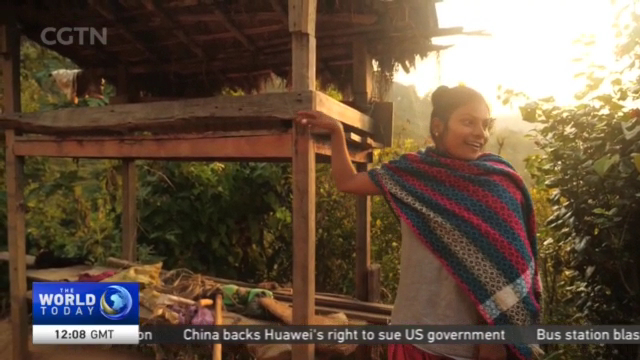
22:33, 08-Mar-2019
Int'l Women's Day 2019: Women struggle against menstruation taboo in Nepal
Updated
22:30, 11-Mar-2019
03:09

International Women's Day is a National holiday in Nepal, a country where gender imbalance remains a deep-rooted problem. In some areas women are still forced out of their homes during menstruation because it's believed they are impure and their presence in the house will bring bad fortune. While these practices are outlawed, they're still common as Tony Cheng discovered when he travelled to western Nepal.
Deep in the hills of Western Nepal, an ancient Hindu practice is common, known as Chhaupadi.
Menstruation is seen as a taboo, a time of impurity and during their period, women must remain outside the house.
Sunita, a lively 16 year old, leads us along the narrow terraces to her home and her menstrual hut.
SUNITA 16 YEARS OLD, LOCAL RESIDENT "I stay here for 5 days. When it's time to eat, I eat over there and when it rains, I can find a bit of cover over there."
It's barely a hut, a tiny wooden structure, with a thatched roof, open to the elements and the biting winter cold."
But unpleasant as it is, the tradition has been in her family for generations.
SUNITA 16 YEARS OLD, LOCAL RESIDENT "This has been practiced for a long time. My grandmother stayed out. My mother did the same, and I'm also doing it. If we go inside the house, they say the gods get angry, and we get sick."
In the capital Kathmandu, Chhaupadi is rare, but this remains a deeply religious country where women are often treated as second class citizens.
TONY CHENG WESTERN NEPAL "Some say this is just a traditional practice of a long held religious belief, but other say it's a violation of basic human rights."
Pressure groups have succeeded in outlawing the practice, but despite stiff penalties not a single person has been prosecuted under the law banning Chhaupadi.
RENU SIJAPATI FEDERATION OF UNTOUCHABLE WOMEN "Unless we change these social and religious leaders, it will be difficult to stop the practice. In those places, these people create pressure to continue the practice."
Grass roots change is starting however.
These women in the Surkhet Valley are going house to house, persuading the women of the area not to practice Chhaupadi.
One of them, Ratna, lost her daughter in law to a snake bite last year while she was in the menstruation hut and now no longer fears the threats of divine retribution.
RATNA BIKA LOCAL RESIDENT "If there were gods, they would have saved her life. When we had difficulties, the gods should have protected us from rain, and other calamities. They should have said they were there for us. Now we women should be aware, and we should be strong. We shouldn't build these separate menstrual huts anymore and we shouldn't stay outside. We should sleep in our houses now."
More than 2 million women live in districts where Chhaupadi is common.
But as the remote areas where they live open up, they're discovering isolation need not be the only option.
And menstruation should not be treated as a crime.
Tony Cheng, CGTN, Western Nepal.

SITEMAP
Copyright © 2018 CGTN. Beijing ICP prepared NO.16065310-3
Copyright © 2018 CGTN. Beijing ICP prepared NO.16065310-3